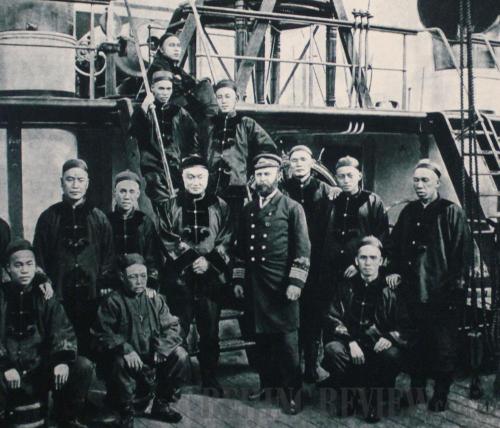

BEIYANG FLEET: Deng Shichang (1849-94) (third left, second row), captain of Zhiyuan, and William Lang (1843-1906) (fourth left, second row) pose for a photo with some Chinese personnel before the Jiawu War. Zhiyuan was sunk by the Japanese during the Battle of the Yalu River. Deng reportedly drowned himself after the loss (FILE PHOTO)
A modernizing Japan
Almost from the day they seized power, the Meiji statesmen in Japan had been determined to make their country a modern, powerful, and worthy of respect internationally.
"The men who seized power in 1868 were nationalists who railed against Japan's semi-colonial status. They were Japanese who were sympathetic to the problems confronting their countrymen," suggested Matsudaira Shungaku (1828-90), a politician during the Meiji Period (1867-1912).
During the two Opium Wars of 1840-42 and 1856-60, Japan watched in horror as European armies forced their way into China. Their first taste of imperialism came in 1854, when the Americans forced Japan to sign the Convention of Kanagawa, which opened two Japanese ports to the United States along with other favorable arrangements.
In 1858, Japan succumbed to continuing Western pressure and signed a set of treaties with the United States, Holland, Britain, France and Russia. The American treaty opened more Japanese ports, allowed commercial activities and set tariff rates.
Against this background, reformers in Japan had pinpointed the need to create more flexible governing institutions that could enlist the abilities of men of talent, promote national unity under the aegis of the Emperor of Japan and build Japan into a great power equal to the most advanced nations on the face of the globe.
Itō Hirobumi (1841-1909) voiced this sentiment when he visited Sacramento, California, in 1872, "We came to study your strength, so that by adopting widely your better ways, we may hereafter be stronger ourselves. We shall labor to place Japan on an equal basis, in the future, with those countries whose modern civilization is now our guide."
The culmination of the Meiji reforms came in 1889, when the Constitution of the Empire of Japan was promulgated. The constitution established mechanisms for sharing power with elected representatives of the nation's citizenry and further promoted Japan into a modern state.
"For the first time, the Japanese people started enjoying the rights as 'nationals,' which gave them more confidence in serving their country. This was an important aspect that guaranteed the success of the Meiji Restoration and the later successes in the First Sino-Japanese War and the Russo-Japanese War (1904-05)," said Zong Zeya, author of The First Sino-Japanese War: 1894-95, published in Beijing in 2012.
With an institutional foundation, reforms in other areas also speeded up during the Meiji Period. Led by the government's support, communications, transportations, national enterprises and banks developed rapidly.
By the end of the 1870s, more than 150 national banks had opened their doors for business. By the time the first Diet convened in 1890, nearly 10,000 miles of telegraph wire and more than 200 telegraph offices had been built to provide instantaneous communication among the country's major cities.
Along with state-owned projects, many private enterprises and workshops were also established. Japan's four great plutocrats—Mitsui, Mitsubishi, Sumitomo and Yasuda—were among the prime examples. Meanwhile, many small workshops in filature and textile also sprung up around the country.
"The development of the private enterprises coped with the trend of history, enlarging the social base for the Meiji Restoration," said Feng Wei, a professor with the Department of History of Shanghai-based Fudan University.
According to Feng, the introduction of private entities distinguished the Meiji Restoration from China's Self-Strengthening Movement. During the Self-Strengthening Movement, almost all the enterprises established by officials were government-supervised.
"The government-supervised enterprises were hybrid operations, and were plagued by the usual bureaucratic inefficiency, corruption and nepotism," Feng said. "From such enterprises, the guns and ships produced were nowhere comparable in quality to their Japanese counterparts."
Copyright ©1999-2018
Chinanews.com. All rights reserved.
Reproduction in whole or in part without permission is prohibited.